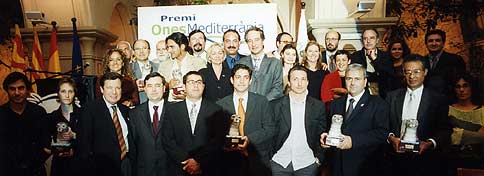WWF backs The Monachus Guardian…
The World Wide Fund for Nature (WWF), reacting positively to an appeal earlier this year by Prince Sadruddin Aga Khan of the Bellerive Foundation, has agreed to become a 2002 sponsor of The Monachus Guardian [see Prince issues appeal, TMG 5 (1): May 2002].
That very welcome news was conveyed to the Prince by WWF International Director-General, Dr. Claude Martin, in June 2002.
The journal's survival had previously been placed in serious jeopardy by the unexpected withdrawal of its former publisher and financial supporter, the International Fund for Animal Welfare [see IFAW bows out, TMG 5 (1): May 2002].
 |

Bellerive Foundation
|
WWF, through its Mediterranean Programme Office based in Rome, now joins Bellerive as the second sponsor of TMG for 2002. WWF MedPO is already engaged in monk seal conservation initiatives elsewhere in the Mediterranean, most notably in Turkey through an EU-funded coastal habitat protection and management initiative spearheaded by Turkish NGO, SAD-AFAG [see Coastal zone management project commences, TMG 5 (1): May 2002].
With Bellerive's active encouragement and support, efforts are currently underway to secure much-needed funds for the continued publication of TMG in 2003 and beyond.
In challenging other organisations to match his funding commitment, Prince Sadruddin has expressed the hope that The Monachus Guardian can be put on a more stable, long-term footing.
"Given its proven track record," writes the Prince, "and a growing support base that is so vital to the conservation of any endangered species – let alone one as neglected as the Mediterranean monk seal – we believe that TMG warrants continued backing."
Organisations or individuals wishing to support the Prince's appeal on behalf of The Monachus Guardian are kindly invited to contact the editor by email or the secretariat of the Bellerive Foundation.
For voluntary subscriptions to the journal or straightforward donations, please turn to our new Seal Appeal page.
Seal rehab proceedings in press
The proceedings of a workshop on seal rehabilitation, held in Liege, Belgium in April 2002, are soon to be released on CD, according to its organisers, Jeny Androukaki of the Hellenic Society for the Study & Protection of the Monk Seal (MOm) and Yvan Larondelle of the Université Catholique de Louvain. The Workshop, held as an adjunct to the 16th Annual Conference of the European Cetacean Society, and entitled Rehabilitation in theory and practice: protocols, techniques, cases, attracted some 40 participants from 12 countries [see Rehab workshop convenes in Liege, TMG 5 (1): May 2002].
Further details of the CD's release and availability are expected to be made available in due course.
RAC/SPA confronts Action Plan failures in Syria
Rather than convene another of its unwieldy conferences (normally held every four years) to assess the (highly questionable) progress of Barcelona Convention signatories meeting their monk seal conservation targets [see UNEP/MAP. 1987. Action plan for the management of the Mediterranean monk seal, available in the Monachus Library], the UNEP/MAP coordinating body RAC/SPA decided instead to hold a far more discrete technical meeting in Syria on 29-30 September 2002.
The two-day conclave, held in the coastal town of Latakia brought together monk seal specialists from Greece, Italy, Morocco and Turkey to define a series of conservation (education, research, legislative and public awareness) initiatives to be proposed to the Contracting Parties of the Barcelona Convention.
The rationale, according to one participant, is that "not enough is being done to halt the decline of the species."
The report generated by the meeting, although still in the process of being finalised, is soon expected to embark on the next leg of its long procedural journey: it must first be endorsed by the Mediterranean Action Plan's National Focal Points before being delivered to the Contracting Parties for approval – whose next meeting is scheduled for autumn 2003.
Based on past experience, those who are waiting for the Mediterranean governments to meet their legal, financial and moral obligations in protecting monk seals would be ill-advised to hold their breath.
Mediterranean Recognition for Calypso
In June, Calypso, Environmental Research Bureau, received the 2002 International Mediterranean Recognition award. The Bureau, which maintains offices in Spain and Greece, received the prize in recognition of its 10-year research and conservation efforts on behalf of the endangered Mediterranean monk seal.
The board of adjudicators included representatives from several Mediterranean Basin countries, including Spain, Italy, Greece, Egypt and Morocco, as well as the Mediterranean Information Office, which acts as a focal point for the region's NGOs. The prize was awarded by the Mediterranean Foundation at the Queen Fortress, Tarragona, Spain, to the Bureau's president and founder, Dr. Daniel Cebrian.
 |
|
The 2002 International Mediterranean Recognition Awards ceremony in Tarragona, Spain
|
Calypso-ERB has implemented monk seal research and conservation projects in Croatia and Greece, including Zakynthos in the Ionian and Milos-Kimolos-Polyegos in the Aegean, the latter an important monk seal breeding area that is now the site of a prospective marine park.
A relevant bibliography has been added to the Monachus Library: Cebrian, D. 2002. Bibliography. Calypso-ERB.
EndQuote
"The monk seal is the symbol of our work – and saving the monk seal means saving the Mediterranean coasts."
– Cem Orkun Kiraç, on the 15th anniversary of Turkey's Mediterranean Seal Research Group (AFAG).
|
|




